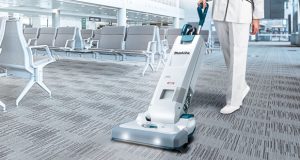By Nils J.van der Zijl, VP Sales & Marketing, Softbank Robotics EMEA
The urgent need for innovation in FM
With the FM and cleaning industry facing enormous pressure to improve cleaning performance in the midst of the COVID-19 pandemic, the need for innovation and fresh approaches to service delivery has never been so great or so urgent.
Successful innovation is crucial to enable FM and cleaning providers to rise to the challenge of meeting client demand for higher cleanliness and hygiene standards in buildings and instilling confidence in workers about the safety of returning to work.
However, as those who have worked in FM for a while know only too well, achieving genuine innovation within commercial cleaning is no easy task. Research we recently conducted amongst FM leaders across EMEA shows that 81% have had innovation efforts that have failed to deliver in the last two years and as many as 96% admit to being cautious about future innovation projects as a result.
There are a wide range of reasons for this failure and scepticism, including technical complexity and a lack of the necessary skills and leadership in the business.
The Capex conundrum
However, arguably more than anything else, FM leaders have been put off from large-scale innovation projects because of the high levels of capital expenditure that are traditionally required, and the risk that comes with this.
At a time when businesses across all sectors are affected by COVID-19 and looking to rationalise costs, who really wants to embark on multi-million pound innovation projects? And this is particularly the case in FM, where so many projects have failed to meet expectations and there is still so little measurement or visibility on ROI.
An Opex model re-defines innovation in FM
However, despite their understandable caution, FM and cleaning leaders recognise that they need to act in order to survive and thrive in a dynamic and turbulent economy. On the supply side, 70% of FM and cleaning firms face increasing pressure from clients to demonstrate innovation, whilst at the same time 86% report having pressure to reduce operational cleaning costs and to manage the high capex of current cleaning approaches.
This is why accessing cutting edge technology through operational, rather than capital, expenditure can be so powerful for FM providers and cleaning contractors. Rather than having to lay out huge sums of cash up front for new machinery, with no guarantees around lifetime value or business impact, an opex, ‘pay monthly’ model, allows FM companies to utilise new technologies in a far more flexible and agile way, with far less financial risk.
For instance, with Whiz, the autonomous vacuum sweeper, FM companies can lease each individual cobot on a monthly basis, as part of a 24 or 36 month agreement. It means clients can immediately start benefiting from this game-changing technology without needing to commit any major capital expense. They also have full visibility and transparency of ongoing repair and maintenance costs, as these are all included within the monthly fee. They can even have a one month free trial period before signing up, further reducing their risk. The cobotic commercial model is a direct response to an urgent and critical business need. It delivers exactly what the FM industry requires at this time, when it is under so much pressure to deliver increased performance and productivity and demonstrate innovation, but service providers simply cannot afford to take on major costs.
Our research, which was conducted at the very outset of the COVID-19 pandemic, certainly backs this up. 70% of FM leaders felt that a leasing model that reduces risk makes new cleaning technologies more attractive and 85% predicted that the introduction of cobotics into cleaning operations will reduce operational costs.
Innovation leaders can be bold… whilst reducing their risk
This shift in approach to innovation requires FM leaders to be open to new ideas and willing to manage structural and cultural change within their organisations. In an industry that has often preferred to stick to what it knows, this can be extremely difficult.
But the cobotic, opex model gives FM leaders the golden bullet they need to win hearts and minds within their businesses. Innovation leaders can introduce the very latest technology into their cleaning operations in a relatively low-risk way and immediately start demonstrating the benefits to stakeholders, whether that’s senior management, clients or frontline staff.
Even within a one-month trial period, we’ve seen businesses that are able to show improvements in a whole range of key metrics, including performance and productivity, cost, client satisfaction and engagement and wellbeing amongst frontline staff. Indeed, the benefits touch every part of the organisation – finance, business development, operational management, HR and frontline staff.
Leasing to be the norm
The shift to leasing and subscription models in our personal lives has been happening for years (such as how we pay for cars and entertainment). And there’s little doubt that this will be replicated in the business world – the unstoppable growth of cloud computing and software-as-a-service being just one example.
In FM, an opex model gives service providers the foundation to address so many of the challenges they face, not just during this unique time, but also in the future. Indeed, there are already signs that many businesses are now starting to turn their attentions from the immediate firefighting that was required during the early months of the pandemic and starting to map out some sort of future-looking strategy. They’re re-imagining how they will use building space in the future and what they will need to deliver world-class experiences to both staff and customers in the years ahead. (There are some really interesting reports emerging on this, including this one from JLL and this from Deloitte).
For FM providers, this presents both a challenge and an opportunity but it goes without saying that they will need to be agile and innovative in their response. Once again, an opex model provides a flexible platform for new approaches and solutions – in fact, 74% of FM leaders believe that leasing models are critical to delivering smarter cleaning to meet the needs of future buildings. This stat alone shows the potential for a cobotic, opex-based model to be a game-changer for FM companies.
FM and cleaning leaders have a small window to get ahead of the curve by adopting a cobotic approach to innovation now. In doing so, they can navigate around the age-old capex barrier to innovation and set their businesses on an accelerated journey to a more agile and resilient operating model that can respond to an unpredictable and rapidly-changing landscape.





